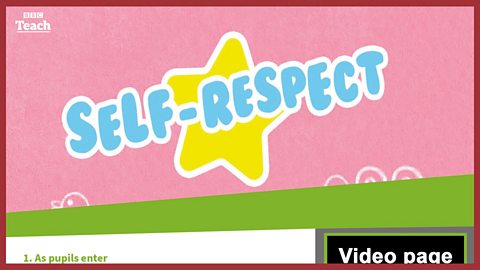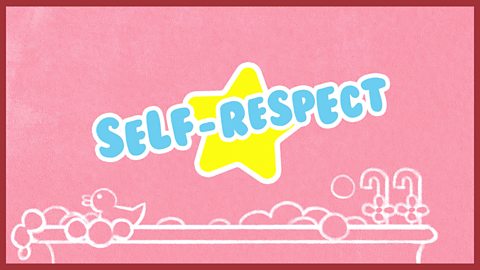In short
Themes: Judaism; Christianity; self-respect; self-belief; confidence; identity; positive thinking.
Summary: This assembly, which is suitable for an act of collective worship, focuses on a story from the Jewish and Christian traditions called David the Singing Shepherd Boy (traditionally known as Samuel anointing David). It focuses on the value of self-respect.
Resources: The ; an image to display ; an image to display of the words

The video
BEN: Hiya! I'm Ben and this is the story of David the Singing Shepherd Boy.
David was the youngest child in his family. His brothers and sisters were all big and strong and their dad Jesse was very proud of them because they were soldiers.
But David was too young to be a soldier. He was just a boy and his job was to look after his dad's sheep.
But David didn't mind. He had a talent for looking after the sheep and he was brilliant at it. He loved being a shepherd and worked really hard to be the best shepherd he could be.
David knew that being in the fields all day made him strong and healthy, which was just as well because sometimes he had to protect the sheep from lions and bears.
Best of all, being alone in the fields gave David lots of time to write poems and songs. He even wrote a song thanking God for making him just the way he was.
DAVID [SINGS]: I know that I'm wonderfully made, thank you for making me.
BEN: We don't actually know the tune to the song.
But, one day when David's brothers and sisters were at home visiting their dad, a man named Samuel called by.
Samuel was a special man who could hear God speak and God had sent him on a secret mission to find the next king. All Samuel knew was that he would be one of Jesse's sons.
Jesse introduced his children one by one. Eliab, the eldest son, was a fine and strong man and Samuel thought, 'Mm, surely he'd make a good king.' But God said no.
In fact, with all the children God said no. He told Samuel, 'Don't think about what they're like on the outside, think about what they're like on the inside; their thoughts, their feelings, what they're really like.'
Samuel turned to Jesse and asked, 'Are these all the children you have?'
JESSE: Well, there is my youngest, but he's only a boy.
SAMUEL: Well, I must meet him!
BOY: Fetch David.
GIRL: Fetch David.
GIRL: Fetch David.
BEN: When David arrived, God said to Samuel, 'This is the one I have chosen to be king!' Can you believe it? David the 'Little Singing Shepherd Boy' was chosen to be the king.
David may not have seemed like a king to some people but, you know what, he had self-respect. And all the things he learned while looking after the sheep helped him become a brave and wise leader.
He became one of the greatest kings in the world! Come on in, guys. Thanks for helping me tell today's treasure story. Now, you might have heard about David, because stories of his life and his songs are written about in the Bible. See you again soon. Bye!
ALL: Bye!
The story of David the Singing Shepherd Boy is found in the Hebrew Bible. Jewish people read the story in the Tanakh (in the ±·±π±ΉΎ±βi³Ύ, which tells the stories of the prophets) and Christians read it in the Book of Samuel in the Old Testament.
Jewish and Christian people believe that God instructed Samuel to choose David as the next king, because of what David was like on the inside. Christians and Jews believe that God does not judge what is on the outside, only a person's character, and when Samuel meets David God says 'This is the one I have chosen to be king!'
This story can help us to reflect on the value of self-respect and why we shouldnβt try to change who we are if those around us are different to us or have different skills.
Duration: 3' 55"
Final words: 'See you again soon. Bye! / Bye!'
Video questions
- What was Davidβs job? (Shepherd)
- What did David feel about this job? Why? (He liked being a shepherd - he had a talent for it)
- What else was David good at? (Writing songs and poetry)
- Who was Samuel? Why did he visit? (He had been sent by God to find the next king)
- Why did Samuel ask Jesse if he had any more children? (Because God had said 'no' to all the other sons)
- What did God say to Samuel when David arrived? ('This is the one I have chosen to be king!')

Key links
Click to display image full size

Click to display image full size

Click to display image full size


Suggested framework
1. Entry
As the children gather display the image of the words
2. Introduction
Ask the children to think of something they are really proud of about themselves. Maybe it is something that other people do not know. Invite children to share what it is that they are really proud of and why it makes them feel proud.
Explain that today the assembly is going to think about the meaning of 'self-respect'. Explain that if we have self-respect we look after our bodies and our minds and we are confident about who we are and what we can do. We had self-respect and showed self-belief when we shared things we were proud of about ourselves.Ask children to look for the value of self-respect in the story as they watch the video. What happens when the shepherd boy believes in himself?
3. Play the video
The duration is 3β 55β and the final words are: βSee you again soon. Bye!β 'Bye!'
4. After the video - Time to talk
Lead a discussion about 'self-respect' in the story by asking all or some of the following:
- How might David have felt being the youngest of the brothers?
- Jesse, Davidβs dad, was proud of all his sons that were soldiers. How might that have made David feel?
- Why did David work hard at being a shepherd?
- What did Samuel know about one of Jesseβs sons?
- What did God tell Samuel he needed to think about when looking for a new king? What was important? Why?
- Why was it a surprise that David was chosen to be king?
5. Opportunity to sing
Suggestions from ΒιΆΉΤΌΕΔ collections below.
6. Opportunity for reflection
Close your eyes for a momentβ¦
And listen to the words that we heard in the story that 'God does not look at the things people look at. People look at the outward appearance, but the Lord looks at the heartβ¦'
Think about the story of Samuel choosing David to be the new king. Say quietly to yourself:
'I am proud of myself.
I am proud of all that I am.
I am proud of all that I can do.
I am proud that I am trying.
I am proud that I am making progress.'
If you ever feel down remember that it is your heart and what is inside you that is important and nobody knows that better than you! That might just remind you to believe in yourself.
7. Opportunity for prayer
Begin with your usual form of address (βDear Godβ, βLet us prayβ, etc) and:
Thank you for the story of 'Samuel anointing David' teaching us the value of self-respect.
Thank you that we are wonderfully made and that you love us for who we are on the inside.
Help us to look for what is inside other peopleβ¦and to show your love to others in all we think and say and do.
Amen.

Suggested songs
Song: 'Chain of love' (All about our school, no 14. Vocal version)
- For the children of tomorrow
Weβve got to make it a better place,
Fill the world with love and laughter,
Make a fresh start for the human race.
(Chorus)
Chain of love, chain of love,
Circle the world with a chain of love,
Chain of love, chain of love,
Circle the world with a chain of love.
- No more war and no more hunger,
No more jealousy and hate,
Say goodbye to greed and sadness,
Make a change now or it will be too late.
(Chorus)
(Middle eight)
Circle the world, circle the world,
Circle the world, circle the world.
- Doesnβt matter where you come from,
Doesnβt matter where youβve been,
Different race or creed or colour,
We are the same underneath our skin.
(Chorus)
Chain of love, chain of love,
Circle the world with a chain of love,
Chain of love, chain of love,
Circle the world with a chain of love.
Circle the world with a chain of love.
Song: 'Praise Him' (Come and Praise, no 40. Vocal version)
Praise Him, praise Him,
Praise him in the morning,
Praise him in the noon-time,
Praise Him, praise Him,
Praise Him when the sun goes down.Trust Him, trust Him,
Trust him in the morning,
Trust him in the noon-time,
Trust Him, trust Him,
Trust Him when the sun goes down.Serve Him, serve Him,
Serve him in the morning,
Serve him in the noon-time,
Serve Him, serve Him,
Serve Him when the sun goes down.Praise Him, praise Him,
Praise him in the morning,
Praise him in the noon-time,
Praise Him, praise Him,
Praise Him when the sun goes down.
Praise Him when the sun goes down.
The Lord's my shepherd - Come and Praise, no 56
